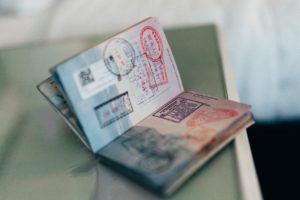 Once USCIS has approved an applicant’s green card petition (Form I-130 for family-based immigrants, or Form I-140 for employment-based immigrants), there are two ways to proceed to obtain legal permanent resident status. Adjustment of status takes place within the United States through USCIS. Consular processing takes place overseas through the State Department, with an initial review conducted by the National Visa Center followed by a final interview at a U.S. embassy or consulate in a foreign country.
Once USCIS has approved an applicant’s green card petition (Form I-130 for family-based immigrants, or Form I-140 for employment-based immigrants), there are two ways to proceed to obtain legal permanent resident status. Adjustment of status takes place within the United States through USCIS. Consular processing takes place overseas through the State Department, with an initial review conducted by the National Visa Center followed by a final interview at a U.S. embassy or consulate in a foreign country.
Consular processing is usually several months faster than adjustment of status, although this depends upon the length of the backlogs at USCIS versus the backlogs at the National Visa Center and the relevant embassy/consulate overseas, which vary considerably over time. Consular processing is also cheaper in terms of the fees payable to the government, although it may involve bearing additional costs to travel from the US to the country where the consular processing will take place. Therefore, given the choice between the two, consular processing is often a better option, but there are reasons to carefully consider both options when planning a green card strategy.
Good Cases for Consular Processing
- The applicant is overseas and has no other way to legally enter the US. Adjustment of status usually requires the applicant to be legally present in the US when they apply (in most cases, with a valid non-immigrant visa). If this is not an option for the applicant, they will most likely need to choose consular processing and wait outside the US.
- The applicant is in the US with a valid non-immigrant visa, but wants to continue traveling to and from the US while their green card is pending. Once an adjustment of status application is filed, the applicant must remain in the United States until they are granted advance parole to leave. While advance parole can be requested at the time of the application, it typically takes months to process, during which time the applicant must stay in the country. This issue can be avoided by using consular processing.
- The applicant is ineligible to adjust status. Adjustment of status is generally not available to individuals with certain immigration statuses (such as Visa Waiver Program visitors and crew members) or with certain legal or immigration issues on their records (such as entry without inspection or unauthorized employment). Unless an exception applies that allows adjustment of status, such individuals may need to leave the United States and go through consular processing to obtain a green card.
Good Cases for Adjustment of Status
- The applicant has an expiring status in the US and wants to stay while their application is processing. This is a common situation among individuals with fixed-term non-immigrant visas that cannot be extended, such as L-1 and H-1B work visas. After their visa expires, they can legally stay in the US while they are waiting for their adjustment of status to be processed. This is not an option if they choose consular processing.
- The applicant needs US employment authorization for themselves or their dependents while their application is processing. Many adjustment of status applicants are eligible to receive an Employment Authorization Document that allows them to work before the green card is processed. This is a convenient option for individuals in the US on work-restricted visas.
- The applicant is unable to return to their home country for a medical examination and visa interview. Sometimes the cost and risk of traveling abroad outweighs the cost and time benefit of consular processing, especially if the applicant is from a very distant or dangerous country, or has medical or family circumstances that preclude them from traveling.
- The applicant has a history of unlawful presence that would trigger a bar to readmission if they left the US, but that does not bar adjustment of status. Overstayers are subject to a bar on re-entry if they leave the United States, but are allowed to adjust status in certain cases, such as by being an immediate relative of a U.S. citizen or filing under the Violence Against Women Act (VAWA). For more on this issue, see: Overcoming an Overstay in the US.